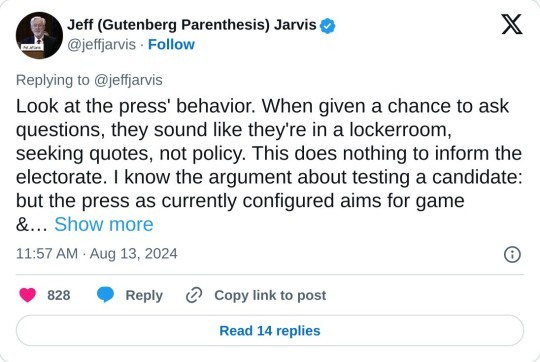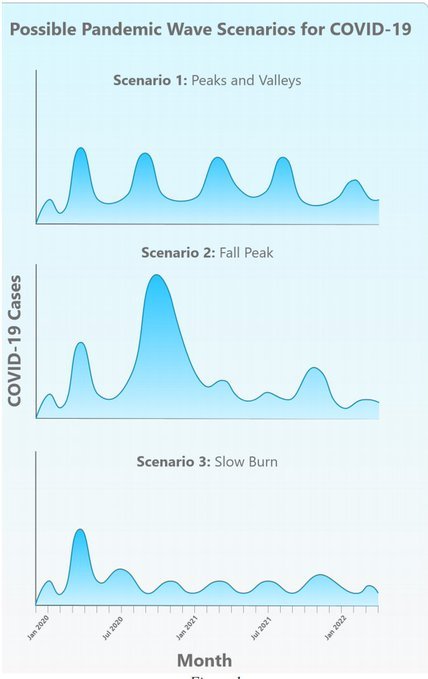#@jeffjarvis
Explore tagged Tumblr posts
Note
Awesome criticism of the MSM, and also a great example of journalists acknowledging each other's criticism!
https://x.com/jeffjarvis/status/1823327909362172256








19 notes
·
View notes
Photo

I can point you to plenty of assholes by name. Anonymity is no cure for what people think ails the internet. Anonymity is the cloak of cowards, yes. But anonymity is also vital to the vulnerable. This is a horrid, privileged take. Enough takes. https://t.co/s49CUmU9Xl – http://twitter.com/jeffjarvis/status/1279150298385256450 – @jeffjarvis
0 notes
Photo

RT @JoycePosey10: @jeffjarvis @RevDrBarber @TheView Exactly. Stop giving them a platform to lie. https://t.co/Pxbptj2pfQ 2PLAN22 http://twitter.com/2PLAN22/status/1303373485788590082
Exactly. Stop giving them a platform to lie. pic.twitter.com/Pxbptj2pfQ
— Joyce Posey (@JoycePosey10) September 8, 2020
#OLASC16 RT @JoycePosey10: @jeffjarvis @RevDrBarber @TheView Exactly. Stop giving them a platform to
0 notes
Photo

Very good essay. The New York Times seems to have permanently paywalled me out of all thier content, but the link Jarvis shares is here. The article is also available on DNyuz a plagarizing link farm.
2 notes
·
View notes
Audio
(Bob Holz)
1 note
·
View note
Text
1 note
·
View note
Text
Tweet from Jeff Jarvis (@jeffjarvis)
Jeff Jarvis (@jeffjarvis) Tweeted:
This is appalling. The both-sidesism of The New York Times comes out in full force from its editorial board as it equates the left criticizing hate and the right burning books. Pure moral panic. A 🧵. 1/ https://t.co/0zQumjCIHh https://t.co/XdqznFrBR3 https://twitter.com/jeffjarvis/status/1504786865261588602?s=20&t=Fj9vnHrRELn-I7sc6ki6tw
0 notes
Photo

The CIDRAP paper recommends preparing for the worst-case, its scenario 2, in which the next wave is *worse* than the wave we are experiencing now. https://t.co/Wrn6TYrdpT – http://twitter.com/jeffjarvis/status/1256588275751555073 – @jeffjarvis
0 notes
Photo

RT @jeffjarvis: @RevDrBarber @TheView Another tactic is to not invite chronic liars on the air. 2PLAN22 http://twitter.com/2PLAN22/status/1303373438501957632
Another tactic is to not invite chronic liars on the air.
— Jeff Jarvis (@jeffjarvis) September 8, 2020
0 notes
Audio
(Bob Holz)
1 note
·
View note
Link
Jeff Jarvis (@jeffjarvis)
Just got to call @HowardStern to congratulate him -- and us -- on him re-signing for another five years.
faved by your 1 friend and 3 others
0 notes
Text
0 notes
Text
Trust seems to be a crucial aspect of journalism, but it is a slippery concept and difficult to measure
A recent piece by CUNY professor and author Jeff Jarvis about how to improve the public’s trust in journalism sparked a Twitter debate among some leading figures in the media industry on the weekend — a debate that centered on whether trust is a meaningful way of looking at the value of news. Since this is a topic that some people even outside the media might be interested in, I collected some of the Twitter discussion in a Storify module, and have also embedded some of it below.
Jarvis’s post was a response to a Medium piece written by Richard Gingras — the head of Google News — and Sally Lehrman, a fellow at the Markkula Center for Applied Ethics who specializes in journalism. In the piece, the two wrote about how the lack of public trust in the media industry is a growing problem, and described some ways in which media companies could try to change that, including:
— Posting a mission statement and ethics policy: “Both news organizations and individual journalists could build trust by stating their objectives, their capabilities and their standards,” Gingras and Lehrman argue.
— More disclosure about the editing process: “News outlets could signal editing levels by creating a clear labeling system or listing all participants in the process such as fact checkers, editors, and even lawyers.”
— Citations (via links) and corrections: Citations “would allow audiences to assess their effort and accuracy. An effective system would also allow audiences to alert editors to perceived inaccuracies.”
In a nutshell, Gingras and Lehrman argue that more transparency about the way that the news business or the journalism business works would serve readers better and increase trust — and that this in turn would help create value for media companies. They said they have created the Trust Project in partnership with the Markkula Center to pursue such changes in the industry.
In his response, Jarvis suggested that since Gingras is concerned about such issues, he could get his employer to “encourage these behaviors by favoring news organizations, journalists, and other sources that follow standards such as these.” This would be an addition signal of quality that Google could use when surfacing news stories, he argued. Google could also rank sites that produce original work higher than sites that just copy or aggregate it, Jarvis said.
After both Gingras and News Corp. executive Raju Narisetti posted a link to Jarvis’s piece, Emily Bell — who runs the Tow Center for Digital Media at Columbia University — questioned whether looking at trust was the right way to think about value in journalism, or increasing the likelihood of success in media.
Although one or two of the suggestions make sense, the idea 'trust' would transform journalism is badly framed https://t.co/CdknqI0Ai0
— emily bell (@emilybell) October 26, 2014
@emilybell That's not terribly helpful. Journalism has a dire crisis in trust. How would you frame it?
— Jeff Jarvis (@jeffjarvis) October 26, 2014
Bell argued that identifying “trustworthiness” was a difficult concept to begin with, since some people might find a certain news source interesting or valuable without it necessarily being trustworthy — and others might disagree on whether a specific outlet was trustworthy or not because of their political views. Bell and others also said that asking Google to measure quality journalism was problematic.
ask the question 'was Edward Snowden trustworthy?'. To most yes, to others absolutely not. People trust what they believe for most part
— emily bell (@emilybell) October 26, 2014
@jeffjarvis @emilybell @tuija Agree with those enhanced values but so uncomfortable with Google embedding these 'values' in search.
— 🧤 Steve Bowbrick 🧤 (@bowbrick) October 26, 2014
One point that Bell seemed to be making was that the success of a media outlet — and particularly its financial success — doesn’t really have any relationship to whether it is “trusted” or not, with BuzzFeed being a good example: in a recent Pew survey, the site ranked low on trustworthiness, and yet its readership and its revenue base appears to be large and growing rapidly.
@PJPrest and external trust has no bearing on performance of business (which is the fallacy at the heart of this suggestion)
— emily bell (@emilybell) October 26, 2014
@richardgingras @mathewi @raju @jeffjarvis gah.The Pew survey said no one trusts Buzzfeed. Yet a. They do good work and b. They are growing
— emily bell (@emilybell) October 26, 2014
Gingras admitted that trust might not be a good substitute or proxy for journalistic value, but he argued that good journalism can’t exist unless readers trust either the news source or the reporter, or both. But Bell countered that in both the NSA leaks case and the Pentagon Papers case, the source of the information was widely mis-trusted, and yet the news stories were still worthwhile.
@emilybell @raju @jeffjarvis Trust does not dictate good journalism but you can't have good journalism without trusting the source/reporter.
— Richard Gingras (@richardgingras) October 26, 2014
@richardgingras @raju @jeffjarvis I am not sure that is true. Look at both the Pentagon papers and the NSA reporting. Both distrusted….
— emily bell (@emilybell) October 26, 2014
At this point, Chris Anderson — a ** at ** who has written about media topics, including a book on the decline of the news business in Philadelphia — pointed out that there is no real correlation between the trustworthiness of journalism and the quality of that journalism, noting that the media was trusted more in the 1950s than at any time since, but the journalism was arguably terrible.
https://twitter.com/Chanders/status/526417314527600641
@jeffjarvis @mathewi @richardgingras @jbenton @raju no-one trusted the press. Ever.
— emily bell (@emilybell) October 26, 2014
Bell pointed out that large numbers of people distrust major news entities such as the New York Times or the Guardian — in other words, people from one side of the political likely distrust the Times but trust Fox News, and others feel the opposite. And she argued that while Walter Cronkite may have been widely trusted during the heyday of TV news, no one would argue that was the best time for journalism.
@mathewi @raju @richardgingras @jeffjarvis …with some but not with others. People trust Fox News. Others trust The Guardian. Few, both
— emily bell (@emilybell) October 26, 2014
@jeffjarvis going back to the Cronkite point (thank you @ibarguen ) no one seriously thinks that was a better state of affairs do they?
— emily bell (@emilybell) October 26, 2014
It’s worth noting that despite her criticism of some aspects of the argument, or about trust as a measure of value, Bell made a point of saying that she agrees with the approach outlined by Gingras and Lehrman, and noted that she was part of the original thinking behind the Guardian‘s embrace of “open journalism.” But trust is a difficult way to measure value because it so subjective, she said.
Trust seems to be a crucial aspect of journalism, but it is a slippery concept and difficult to measure was originally published on mathewingram.com/work
0 notes
Photo

Drink! @jeffjarvis @ginatrapani #HabermasChipotleGlee #London #ShotOnAndroid #TeamPixel #ShotOnPixel3XL #Pixel3XL (at Chipotle Mexican Grill) https://www.instagram.com/p/BtvcGEVBtUm/?utm_source=ig_tumblr_share&igshid=m9o5sckun0vz
0 notes
Quote
The internet is the people’s press. It is a machine that spreads power.
Attacks on the People’s Press. Trump’s war on TikTok and Murdoch’s on… | by Jeff Jarvis | Whither news? | Sep, 2020 | Medium
0 notes
Photo

Yow. Verizon takes a $4.6b writedown on Oath, making it all--Yahoo, Aol, HuffPo--worth only $200m, 30% less than HuffPo alone was worth when Aol bought it. What were they thinking? https://t.co/7axbiW1TBn
— Jeff Jarvis (@jeffjarvis) December 11, 2018
0 notes